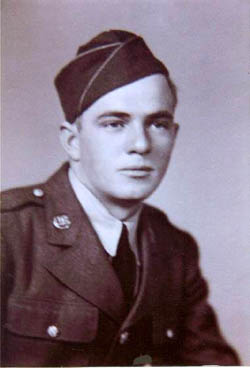Twin Brother of SSG Roy Booher remembered in Norbeek, Netherlands.
Roy Booher was KIA on September 12th, 1944 near Norbeek, Netherlands. (In "Workhorse of the Western Front", Roy's last name was mis-spelled as Bocher. He is also mentioned as receiving the Bronze Star w/2 OLC under the mis-spelled name)
Ray Booher was wounded in Normandy, once at Mortain, again at Aachen after which he spent most of Oct/Nov 1944 in a hospital near Paris. He stayed a few weeks in the hospital, went AWOL hitching a ride back to Co. B, 120th. He was severely wounded at Thirimont in Jan. and sent home. Ray in mentioned on Page 89 in Capt. Murray S. Pulver's book, The Longest Year.
Following stories are related by the Nephew of Ray and Roy, Gary Booher.
Ray and Roy Booher, twin sons of Jim and Ada Booher, born Sept. 21, 1920 in Burkesville Kentucky. The son of a farmer and sawmill owner, Roy grew up on a farm in south-central Kentucky. Ironically, our family is of German decent. Our ancestor, John Bucher, came from Germany ( near Bad Neuhiem ) to Lancaster PA.
Because the great depression of 1929 made life in rural Kentucky difficult, Ray and Roy moved to Anaheim California in 1940. They went to work for their uncle, Barney Booher who had a trucking business. Their parents and younger brothers and sisters also left their Kentucky farm for the opportunities available in southern California in 1941.
At the outbreak of WWII, one of the twins was drafted, no one remembers which one, so the other twin joined at the same time. It was against policy for brothers to serve in the same regiment, but the military did put them in the same division, the 30th Infantry, with Roy going to the 119th and Ray to the 120th. They went to Camp Blanding Florida for training. I have several letters they sent home during their army days. From letters they sent home, I think they only saw each other once after leaving England in June of 1944.
Somewhere in a small French village at the beginning of August, 1944, the 119th and 120th passed thru each other. Uncle Ray told other family that as he was walking through this town, Uncle Roy yelled down to him from a porch where he was sitting. They had a joyous reunion for about 30 minutes., it was the last time they would ever see other. Uncle Ray said he got word about Roy's death from some of the 119th boys just a day or so after it happened. To my knowledge, he never spoke of it again to anyone.
Ray was wounded himself just a couple of weeks later. He was transported to Paris to a hospital. He stayed a few weeks, then went AWOL from the hospital, hitched a ride back up to the front and rejoined Company B of 120th. On Jan. 14 or 15, 1945, Ray was severely wounded near Thirimont. He was shot in the hips from a machine gun. This time he was sent home, stayed in hospitals for several months. For some reason, his wounds would never completely heal, they would fester up and he would have to go have pieces of metal removed. He suffered from those wounds the rest of his life. I think he had a good life. Married, had three sons, owned and operated a chicken ranch in Fullerton California, and later in Norco California. He died in Corona California in April of 1980 and is buried in a military cemetery near Riverside California.
They were from a large family, 13 children. Seven sons, my father the youngest. Four of the sons went to war, 2 to the Pacific in the Navy, and the twins Ray and Roy in the 30th. They joined together, and were kept in the same Division but not
the same Regiment. I have made it my quest to find out as much about uncle
Roy as I could. I was born after the war, so I never knew him. As children
and grandchildren in that large family, we were never allowed to talk about
uncle Roy, nor mention the war to uncle Ray. I guess Roy's death was
devastating to the family, and Ray's wounds and mental anguish were things
the family just didn't want to think about. Uncle Ray just never talked
about the war, few people knew he was a decorated war vet. Ray lived to be
61 years old, had a family etc.. but suffered from those mental and physical
wounds the rest of his life. After he passed away, I came in possession his
Workhorse of The Western Front book. Since Roy was never married nor had
children, I decided to try to find out what I could about his service time.
It is a difficult search.
Source: http://www.indianamilitary.org/30TH/Diary/Booher-Roy-Ray/Booher-Roy.htm

PRIVATE CITIZENS SUPPORTING AMERICA'S HERITAGE
American
War Memorials Overseas, Inc.
War Memorials Overseas, Inc.
Booher Ray Glynn
Name:
Ray Glynn Booher
Rank:
Sergeant
Serial Number:
Unit:
120th Infantry Regiment, 30th Infantry Division
Date of Death:
1980-04-30
State:
California
Cemetery:
Crestlawn Memorial Park Riverside, Riverside County, California
Plot:
Row:
Grave:
Decoration:
Purple Heart
Comments:
